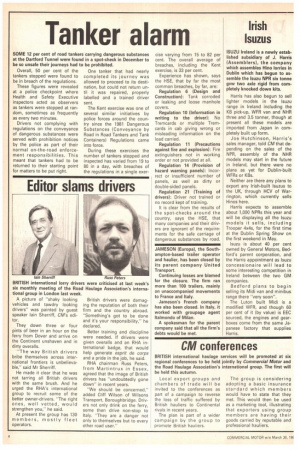Tanker alarm
Page 8

If you've noticed an error in this article please click here to report it so we can fix it.
SOME 12 per cent of road tankers carrying dangerous substances at the Dartford Tunnel were found in a spot-check in December to be so unsafe their journeys had to be prohibited.
Overall, 50 per cent of the tankers stopped were found to be in breach of the regulations.
These figures were revealed at a police checkpoint where Health and Safety Executive inspectors acted as observers as tankers were stopped at random, sometimes as frequently as every two minutes.
Drivers not complying with regulations on the conveyance of dangerous substances were served with prohibition notices by the police as part of their normal on-the-road enforcement responsibilities. This meant that tankers had to be returned to their starting point for matters to be put right. One tanker that had nearly completed its journey was allowed to proceed to its destination, but could not return until it was repaired, properly labelled and a trained driver sent.
The Kent exercise was one of several similar initiatives by police forces around the country since the 1981 Dangerous Substances (Conveyance by Road in Road Tankers and Tank Containers) Regulations came into force.
During these exercises the number of tankers stopped and inspected has varied from 19 to 80 in a day, with breaches of the regulations in a single exer cise varying from 15 to 82 per cent. The overall average of breaches, including the Kent exercise, is 33 per cent.
Experience has shown, says the HSE, that by far the most common breaches, by far, are: Regulation 6 (Design and Construction): Tank corroded or leaking and loose manhole covers.
Regulation 10 (Information in writing to the driver): No Tremcards or multiple Tremcards in cab giving wrong or misleading information on the load carried.
Regulation 11 (Precautions against fire and explosion): Fire extinguishers not in working order or not provided at all.
Regulation 14 (Provision of hazard warning panels): Incorrect or insufficient number of panels, as well as dirty or double-sided panels.
Regulation 21 (Training of drivers): Driver not trained or no record kept of training.
It is clear from the results of the spot-checks around the country, says the HSE, that many companies and their drivers are ignorant of the requirements for the safe carriage of dangerous substances by road.
JAMESON (Europa), the Southampton-based trailer operator and haulier, has been closed by its parent company United Transport.
Continuing losses are blamed for the closure. The firm ran more than 100 trailers, mainly on unaccompanied movements to France and Italy.
Jameson's French company has also been closed. In Italy, it worked with groupage agent halmondo of Milan.
A spokesman for the parent company said that all the firm's debts would be met.
























































































































































